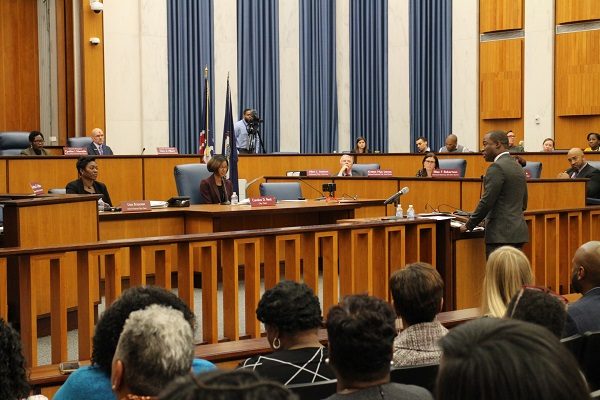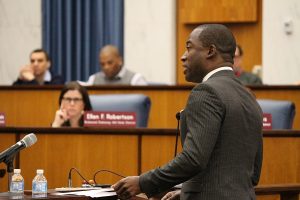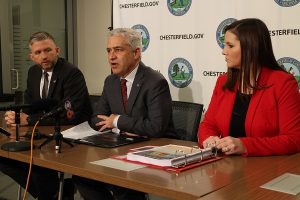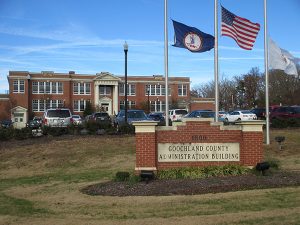
Mayor Levar Stoney presented his budget proposal to City Council this month. (Photos by Jonathan Spiers)
Local governments in the region are in the thick of finetuning their proposed operating budgets for next fiscal year, with some tweaking their approaches to supporting business activity and economic investment more than others.
While the metro’s three most populous counties are looking to balance their proposals based on existing ad valorem tax rates, the City of Richmond is mulling the most dramatic proposed adjustment among area localities this budget season: Mayor Levar Stoney’s pitch to increase the city’s real estate tax rate by 9 cents to $1.29 per $100 of assessed value.
That hike would be accompanied, if Stoney gets his way, by the city’s first cigarettes tax of 50 cents per pack, projected to generate $3 million in additional annual revenue, on top of a jump of $21.1 million from the proposed real estate tax hike. The additional revenues are intended to help pay for increased investments in schools and street repairs in particular.
Stoney pitched the plans as part of his administration’s proposed amendments to the city’s biennial budget, a two-year fiscal plan that was adopted last year and includes the upcoming fiscal year, which begins July 1 and ends June 30, 2020.

Stoney pitched the plans as part of his administration’s proposed amendments to the city’s biennial budget.
The proposals, among other adjustments Stoney presented this month, would require approval from City Council.
Stoney has framed the increased real estate tax as a restoration of the rate to its pre-recession level, noting that tax cuts in 2006 and 2007 reduced the rate to its current $1.20 per $100 of assessed value – the highest ad valorem rate among localities in the region.
Other proposed adjustments include an additional $965,000 to GRTC for increased bus service and route frequency, and $2.9 million dedicated to the city’s Affordable Housing Trust Fund, investment in which was increased last year from $731,000 to $1 million per year in FY19 and FY20. Grants from the fund have been used to help pay for such projects as a renovation to the William Byrd building.
On the economic development front, the city recently hired a new deputy chief administrative officer, Sharon Ebert, to oversee that department, which split off from the larger economic and community development office as part of last year’s budget recommendations. The office was divided into that department and a new Department of Housing and Community Development.
Stoney’s FY20 proposal projects general fund revenues at $757.9 million, a 5.29 percent increase over the current fiscal year budget. The biennial budget approved last year was structured based on a general fund budget totaling $715.2 million for FY19 and $710.6 million for FY20.
BPOL tax cuts continue
In Henrico, County Manager John Vithoulkas proposes a $1.32 billion budget for FY20 with a general fund of $918.6 million, up 5.4 percent from the current general fund. The budget would maintain the county’s existing real estate tax rate of 87 cents per $100 of valuation.
Among the county’s budget’s business-specific proposals is a continuation of increases made in recent years to its exemption threshold for business license taxes – called BPOL, or Business, Professional, Occupational License taxes. The budget would increase that threshold from $300,000 to $400,000, meaning businesses’ first $400,000 in gross receipts are exempt from the county’s BPOL tax rate of 20 cents per $100.
The change, which follows similar incremental increases to the threshold in recent years – from $100,000 to $200,000 two years ago and from $200,000 to $300,000 last year – would make exempt just over 14,000 businesses in the county, or 72 percent of Henrico’s roughly 25,000 total businesses, Vithoulkas said.
He said the effort has been a priority in recent years for county supervisors, who have been pushing for the tax breaks since 1996 and steadily building them over the past two decades. He said the moves are a response to economic conditions but also strategic in attracting economic investment to the county.
“It’s all about creating that business-friendly environment,” Vithoulkas said. “The board of supervisors really has wanted to create a less-onerous environment for businesses on the tax side. I think the county was the first locality in the commonwealth to exempt a certain amount of gross receipts from taxation.”
Where it took the board four years to reach a $100,000 exemption threshold, Vithoulkas noted the threshold has quadrupled in less time – three years.
“Yes, it’s the result of a positive economy, but we also find that the more we do on the tax side as far as creating a less-onerous environment, the more we have on the jobs side,” Vithoulkas said. “It’s a formula that has been working, and it’s allowing us to do things like provide significant new dollars to our schools, build new roads, build new sports facilities.”
To those ends, funding priorities in the budget include $35 million in new money for schools, including planned replacements of J.R. Tucker and Highland Springs high schools, $2 million for construction of a county aquatics center and $1 million set aside in debt service for a planned indoor sports complex.
Counties holding steady
In Chesterfield, County Administrator Joe Casey’s $1.43 billion budget maintains the current real estate tax rate of 95 cents per $100 of valuation – a rate achieved by a 1-cent reduction last year.

Chesterfield County Administrator Joe Casey, center, briefed reporters on his budget proposal alongside deputy administrator Matt Smith and budget director Meghan Coates.
Other tax rates and fees likewise would hold steady, save for a new personal property tax classification on computer equipment and peripherals used in data centers. The proposed rate for that classification is 24 cents. A public hearing on the county’s proposed tax rates ordinance in relation to the proposed budget was scheduled to be held at county supervisors’ regular meeting today, March 27.
In Hanover, County Administrator Rhu Harris is proposing a $492 million all-fund budget that maintains existing tax rates and represents a 6.3 percent increase over the current budget. The general fund budget, at $267.1 million, is a 5.8 percent increase over this year.
Harris said the county has found success in recent years in maintaining its tax rates for residents as well as businesses.
“By maintaining the tax rates, we feel we’re trying to give them a way to be consistent in what their expectations might be in Hanover,” Harris said. While no major changes are proposed in the budget, Harris said there is “continued emphasis on our economic development activities.”
Meanwhile, Goochland County is proposing several business-specific initiatives in its proposed budget, which totals $87.5 million with a $56.2 million general fund – a 5.8 percent increase over the current general fund.
Among other tax changes, County Administrator John Budesky is proposing an increase to Goochland’s business license tax exemption threshold from $4,000 to $10,000 in gross receipts. Like Chesterfield, Goochland also is proposing a personal property tax rate for data centers at 40 cents per $100.
Goochland also is upping its economic development budget to just over $231,000, up from about $230,000 this fiscal year and $160,000 in FY17, when the department was established. The increases are aimed at improving services with existing businesses and attracting new commercial investment.
Budget workshops are underway and will culminate with public hearings before respective boards vote on each proposal. Localities are required to adopt their budgets before the start of the fiscal year.
Full budget proposals can be found here for Chesterfield, here for Goochland, here for Hanover, here for Henrico and here for Richmond.

Mayor Levar Stoney presented his budget proposal to City Council this month. (Photos by Jonathan Spiers)
Local governments in the region are in the thick of finetuning their proposed operating budgets for next fiscal year, with some tweaking their approaches to supporting business activity and economic investment more than others.
While the metro’s three most populous counties are looking to balance their proposals based on existing ad valorem tax rates, the City of Richmond is mulling the most dramatic proposed adjustment among area localities this budget season: Mayor Levar Stoney’s pitch to increase the city’s real estate tax rate by 9 cents to $1.29 per $100 of assessed value.
That hike would be accompanied, if Stoney gets his way, by the city’s first cigarettes tax of 50 cents per pack, projected to generate $3 million in additional annual revenue, on top of a jump of $21.1 million from the proposed real estate tax hike. The additional revenues are intended to help pay for increased investments in schools and street repairs in particular.
Stoney pitched the plans as part of his administration’s proposed amendments to the city’s biennial budget, a two-year fiscal plan that was adopted last year and includes the upcoming fiscal year, which begins July 1 and ends June 30, 2020.

Stoney pitched the plans as part of his administration’s proposed amendments to the city’s biennial budget.
The proposals, among other adjustments Stoney presented this month, would require approval from City Council.
Stoney has framed the increased real estate tax as a restoration of the rate to its pre-recession level, noting that tax cuts in 2006 and 2007 reduced the rate to its current $1.20 per $100 of assessed value – the highest ad valorem rate among localities in the region.
Other proposed adjustments include an additional $965,000 to GRTC for increased bus service and route frequency, and $2.9 million dedicated to the city’s Affordable Housing Trust Fund, investment in which was increased last year from $731,000 to $1 million per year in FY19 and FY20. Grants from the fund have been used to help pay for such projects as a renovation to the William Byrd building.
On the economic development front, the city recently hired a new deputy chief administrative officer, Sharon Ebert, to oversee that department, which split off from the larger economic and community development office as part of last year’s budget recommendations. The office was divided into that department and a new Department of Housing and Community Development.
Stoney’s FY20 proposal projects general fund revenues at $757.9 million, a 5.29 percent increase over the current fiscal year budget. The biennial budget approved last year was structured based on a general fund budget totaling $715.2 million for FY19 and $710.6 million for FY20.
BPOL tax cuts continue
In Henrico, County Manager John Vithoulkas proposes a $1.32 billion budget for FY20 with a general fund of $918.6 million, up 5.4 percent from the current general fund. The budget would maintain the county’s existing real estate tax rate of 87 cents per $100 of valuation.
Among the county’s budget’s business-specific proposals is a continuation of increases made in recent years to its exemption threshold for business license taxes – called BPOL, or Business, Professional, Occupational License taxes. The budget would increase that threshold from $300,000 to $400,000, meaning businesses’ first $400,000 in gross receipts are exempt from the county’s BPOL tax rate of 20 cents per $100.
The change, which follows similar incremental increases to the threshold in recent years – from $100,000 to $200,000 two years ago and from $200,000 to $300,000 last year – would make exempt just over 14,000 businesses in the county, or 72 percent of Henrico’s roughly 25,000 total businesses, Vithoulkas said.
He said the effort has been a priority in recent years for county supervisors, who have been pushing for the tax breaks since 1996 and steadily building them over the past two decades. He said the moves are a response to economic conditions but also strategic in attracting economic investment to the county.
“It’s all about creating that business-friendly environment,” Vithoulkas said. “The board of supervisors really has wanted to create a less-onerous environment for businesses on the tax side. I think the county was the first locality in the commonwealth to exempt a certain amount of gross receipts from taxation.”
Where it took the board four years to reach a $100,000 exemption threshold, Vithoulkas noted the threshold has quadrupled in less time – three years.
“Yes, it’s the result of a positive economy, but we also find that the more we do on the tax side as far as creating a less-onerous environment, the more we have on the jobs side,” Vithoulkas said. “It’s a formula that has been working, and it’s allowing us to do things like provide significant new dollars to our schools, build new roads, build new sports facilities.”
To those ends, funding priorities in the budget include $35 million in new money for schools, including planned replacements of J.R. Tucker and Highland Springs high schools, $2 million for construction of a county aquatics center and $1 million set aside in debt service for a planned indoor sports complex.
Counties holding steady
In Chesterfield, County Administrator Joe Casey’s $1.43 billion budget maintains the current real estate tax rate of 95 cents per $100 of valuation – a rate achieved by a 1-cent reduction last year.

Chesterfield County Administrator Joe Casey, center, briefed reporters on his budget proposal alongside deputy administrator Matt Smith and budget director Meghan Coates.
Other tax rates and fees likewise would hold steady, save for a new personal property tax classification on computer equipment and peripherals used in data centers. The proposed rate for that classification is 24 cents. A public hearing on the county’s proposed tax rates ordinance in relation to the proposed budget was scheduled to be held at county supervisors’ regular meeting today, March 27.
In Hanover, County Administrator Rhu Harris is proposing a $492 million all-fund budget that maintains existing tax rates and represents a 6.3 percent increase over the current budget. The general fund budget, at $267.1 million, is a 5.8 percent increase over this year.
Harris said the county has found success in recent years in maintaining its tax rates for residents as well as businesses.
“By maintaining the tax rates, we feel we’re trying to give them a way to be consistent in what their expectations might be in Hanover,” Harris said. While no major changes are proposed in the budget, Harris said there is “continued emphasis on our economic development activities.”
Meanwhile, Goochland County is proposing several business-specific initiatives in its proposed budget, which totals $87.5 million with a $56.2 million general fund – a 5.8 percent increase over the current general fund.
Among other tax changes, County Administrator John Budesky is proposing an increase to Goochland’s business license tax exemption threshold from $4,000 to $10,000 in gross receipts. Like Chesterfield, Goochland also is proposing a personal property tax rate for data centers at 40 cents per $100.
Goochland also is upping its economic development budget to just over $231,000, up from about $230,000 this fiscal year and $160,000 in FY17, when the department was established. The increases are aimed at improving services with existing businesses and attracting new commercial investment.
Budget workshops are underway and will culminate with public hearings before respective boards vote on each proposal. Localities are required to adopt their budgets before the start of the fiscal year.
Full budget proposals can be found here for Chesterfield, here for Goochland, here for Hanover, here for Henrico and here for Richmond.





So as the counties become more and more business friendly, the city makes the hurdles higher and higher. As a local business owner, I have to take this environment into account before making any additional investments within the city of Richmond. When folks like me become hesitant to invest here, do you think the city’s fiscal situation gets better or worse?
Richmond home owners rose up and demanded action from their council members against the corruption in the real estate assessor’s office in 2003. The director was forced to step down. Democracy works. Levar Stoney has no idea what he is about to unleash.